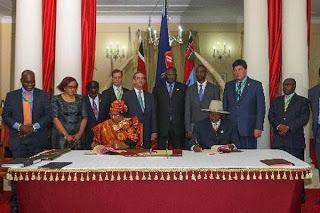
(PHOTO: Malawian President Joyce Banda and her Ugandan counterpart Yoweri Museveni signing the "Joint ICGLR-SADC Final Communiqué on the Kampala Dialogue" on Thursday, December 12, 2013, at State House, Nairobi, Kenya)
***
Three separate documents were signed yesterday in Nairobi to mark the end of the Kampala talks between the DRC government and M23 insurgency.
Bertrand Bisimwa signed the death of his "terrorist group"--as M23 is labeled by the DRC government--under the weary gaze of DRC President Joseph Kabila, whereas Congolese Foreign Minister Raymond Tshibamba signed a separate declaration acknowledging M23's seppuku.
Presidents Museveni and Banda signed the ICGLR-SADC joint communiqué for the two regional organizations they're respectively chairing.
So, are lights back on in the cinema and are could we now be filing for the exit doors at the end of this nightmarish B-series movie which, despite its blood and gore, is still a film after all?
Or should we heed Ambassador Samantha Power who, among those that hailed the signing of the Nairobi declarations, clearly encapsulated in one fizzy tweet the whole bloody enterprise of M23 internationalist bandits?
Ambassador Power tweeted:
"@AmbassadorPower: With today's end to the #KampalaDialogue, it's official: after terrorizing Congolese civilians for 1.5 years, the #M23 rebellion is over."
So if M23 have the global notoriety of being terrorists preying on civilians, why on earth compel the DRC government to sign with them declarations, however separate these happen to be?
As I tweeted yesterday, there's a fundamental hypocrisy underpinning both the Kampala talks and the Nairobi Declaration: the deafening silence on the role of the vicious enabler and boogeyman played--and still being played--by Museveni.
Some analysts are astonished by the fact that the text the DRC refused to sign in Kampala is no different from the one it finally agreed to sign in Nairobi almost surreptitiously in the din and confusion of Kenya's Jamuhuri Day festivities.
Well, maybe the Congolese government, under heavy international pressure (with the exception of Belgium), was simply equivocating about signing anything on the territory of one of the two major backers of M23--the other one being obviously Rwanda's President Paul Kagame!
Just the other day, in an interview, Museveni had the galls of comparing his protection of fugitive M23 thug Sultani Makenga--a mass murderer and a looter of DRC government and civilians' property and resources--to the one he had extended to Laurent-Désiré Kabila who was then wanted by the Mobutu regime.
Some passages of the Joint ICGLR-SADC Final Communiqué on the Kampala Dialogue--the ones rehearsing the 11 points of agreement between M23 and the DRC--are so tilted in favor of the insurgents they might as well have been scribbled down and inserted by M23 and their Ugandan enablers as the Congolese negotiators were asleep on the switch.
The first one of those 11 points for instance gives M23 an agency it no longer has on the ground:
"Decision by M23 to end rebellion and transform itself into a legitimate political party."
The action words in that sentence are outrageous: M23 didn't "decide" out of the blue "end rebellion"; it was compelled to do so by military force. In fact, that (non)decision was taken in Uganda where M23 fighters had fled. Besides, there's illegality and unconstitutionality built in into the second clause of that sentence: M23 can't "transform itself into a legitimate political party" without going through the appropriate judicial channel. And how could M23 clear this legal hurdle if their political platform--or "ideology" to use Museveni's word; or "ID-logy, if I'd be allowed to use the terrific word coined by Comaroff & Comaroff--is an ethnic platform, which is unconstitutional in the DRC? What's more, if the whole leadership of M23 can't be covered by the amnesty bill the government is set to introduce in the National Assembly, how on earth could this terrorist movement "transform itself into a legitimate political party"?
At the risk of passing for a worrywart, I think the most alarming point of the 11 points agreed upon in Kampala is the 10th point relating to the "Implementation of the conclusions of the review of the implementation of the 23rd March 2009 Agreement."
This swings us back into the endless merry-go-round of failed so-called "peace deals" fueling eponymous rebellions...
***
PHOTO CREDITS: Photo via nation.co.ke
